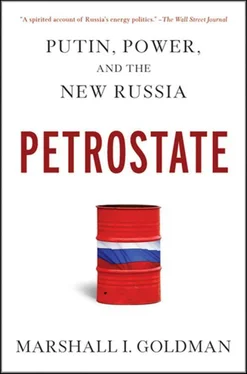With a flick of a switch, those dispatchers sitting in this Moscow room could freeze—and indeed have frozen—entire countries. At the very least, they could send their citizens off in a panic in search of sweaters, scarves, and blankets. What an empowering feeling! Should they choose to, those Gazprom functionaries could not only cut off natural gas from the furnaces and stoves of 40 percent of Germany’s homes but also the natural gas that many German factories need for manufacturing a range of products from ammonia fertilizer to plastics. While Germany purchases more natural gas from Russia than any other country in Europe, all of Western Europe is now also hooked up directly or indirectly to the Gazprom pipeline. In the extreme case, the Baltic states and Finland import 100 percent of their natural gas from Russia.
Here then in front of me was the natural gas distribution brain center for virtually the whole European continent. I could not think of anything comparable in Europe where such an essential commodity can be controlled by one country, and more than that, one company. In this very room the dispatchers factor in weather forecasts, special production needs, holidays, and, while they are reluctant to acknowledge it (in fact they deny it), a customer’s political correctness. Despite the fact that the Russian government owns more than 50 percent of Gazprom’s shares and President Vladimir Putin takes a very personal and intense interest in Gazprom’s operations, Gazprom officials insist that politics never, ever affect their calculations.

FIGURE 1 Dispatching Center at Gazprom Headquarters, Moscow. Gazprom is Russia’s largest company and the biggest extractor of natural gas in the world. Copyright © Mauro Galligani/Contrasto-Redux.
“Gazprom is a reliable energy partner” goes the mantra: it adheres to its contracts, guarantees delivery, and assures “energy security.” As Alexander Medvedev, the deputy chairman of Gazprom, told us that same morning, “What is good for a strong Gazprom is good for the world.” Reminiscent of Charles E. Wilson, the CEO of General Motors in the 1950s who boasted that “What was good for our country was good for General Motors and vice versa,” Medvedev’s pairing of Gazprom and the world is understandable but is as much off the mark as was Charlie Wilson’s earlier formulation.
Russia has not hesitated in the past to cut off the flow of both petroleum and gas to strengthen its side of a political dispute, a practice it inherited from its forebears in the Soviet Union’s Ministry of the Gas Industry and Ministry of the Petroleum Industry. Europeans are realizing how dependent on Russia they have become as each year they rely more and more on Russian natural gas imports. Gazprom and, by extension, the Russian government are already beginning to enjoy a power over their European neighbors far beyond the dreams of the former Romanov czars or the Communist Party general secretaries. President Vladimir Putin, with his control of Gazprom as well as another state-owned petroleum company, Rosneft, had become a real-life Dr. No—an archetypal James Bond villain, complete with a yacht and retinue. As President Putin at the time noted in a three-hour meeting following our Gazprom visit, Gazprom and Rosneft are very real and each year are accumulating more and more wealth and international influence, which they are using to advance the interests of the Russian state.
But it is not only Europe that finds itself each day becoming more and more dependent on energy exports from Russia. Although the United States is separated from Russia by oceans, it also is beginning to import and consume more and more Russian energy. As in Europe, the United States is trying to reduce its overreliance on energy imports from the Middle East. As part of this diversification, in 2005 the United States imported close to $8 billion worth of Russian petroleum. In 2006, that jumped by 25 percent to $10 billion. True, that represented only 3 percent of our petroleum imports—small, but an increase from the 2.2 percent of 2004 and a hint that we are likely to increase imports in the future. 1More than that, in 2000, LUKoil, one of Russia’s largest private oil companies, purchased nearly 3,000 filling stations in the United States from Getty Oil and Mobil and is now busily converting them into LUKoil outlets. It also should be noted that in 2006, Russia became the world’s largest producer of petroleum, producing more than Saudi Arabia. This is not the first time Russia has produced more petroleum than anyone else. It also reigned as the world’s largest producer in the late 1970s and 1980s. Even this was not unprecedented. As Table Intro.1 indicates, Czarist Russia from 1898 to 1901 also produced more oil than the United States, until then the leader.
Equally unusual, even though there are no natural gas pipelines connecting the United States with Russia, Gazprom is also beginning to export LNG (liquified natural gas) to the United States. For the time being, because Gazprom as yet lacks the technology to produce LNG on its own, it is a swap arrangement. These shipments under the Gazprom label actually originate in Algeria (in exchange, Gazprom pipes gas to some of Algeria’s customers in Europe), but by 2010, Gazprom anticipates (unrealistically) that it will supply as much as 10 percent of the natural gas the United States needs as LNG directly from its own fields. 2Given that the United States has fairly large natural gas reserves of its own and supplements domestic production with imports by pipeline from Canada, it is unlikely that the United States will ever become as beholden to Russia for its energy as Germany or Austria have become. Yet Russia’s emergence as an energy superpower will have a long-term impact on U.S. and world diplomacy if for no other reason than that our European allies will begin to think twice before saying “no” to Russia.
TABLE INTRO. 1 Russian and American Petroleum Production and Exports (mill. metric tons)




EUROPE BECOMES VULNERABLE
I had a chance to discuss this new strategic relationship with President George W. Bush at a June 2006 meeting in the Oval Office. The meeting was called to brief him before the G-8 meeting in St. Petersburg, which was to take place a few weeks later. President Putin as chairman of the 2006 meetings had repeatedly insisted that energy security and Russia’s role as a reliable supplier should be the general theme. “The Russian Federation has always abided by all of its obligations, fully and completely, and it will continue to do so.” 3Considering that only seven months earlier during a cold January 2006, Gazprom had curbed its flow of gas to Ukraine, which in turn reduced the flow to the rest of Western Europe, this was a rather dubious concept. Ostensibly, Gazprom justified the drop in gas exports to Ukraine, as well as to Georgia and Moldova, explaining that it did this because all three refused to pay the European market price. But since other Russian customers, especially Belarus and Armenia at the time, were also paying below European market prices, it was widely agreed that Russia was using its gas more as a political than an economic weapon.
Читать дальше

















